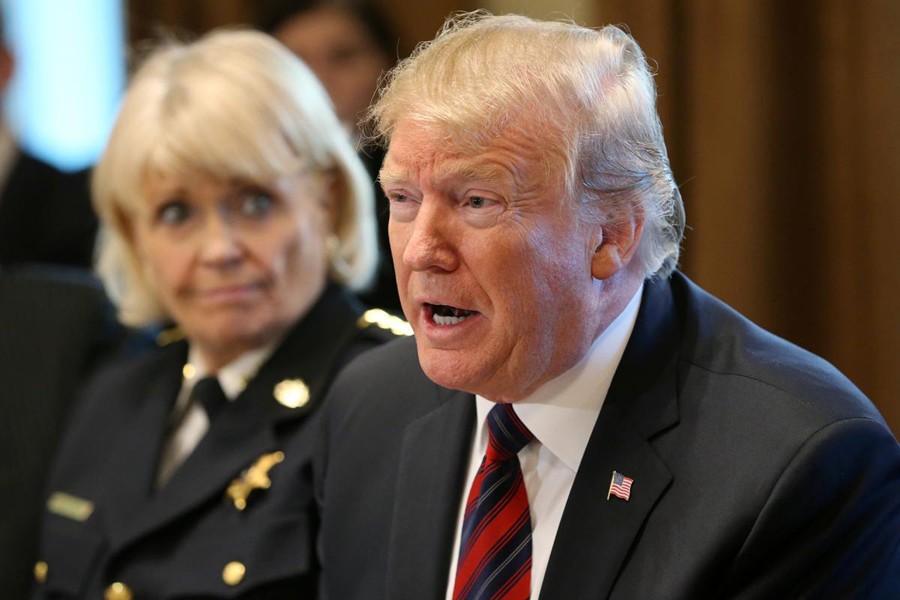President Donald Trump said on Friday he would not declare a national emergency “right now” to end a standoff over border security that has idled large swaths of the US government, all but guaranteeing that he will preside over the longest shutdown in US history.
The dispute has disrupted everything from air travel to tax collection and suspended pay for 800,000 government workers.
Trump has repeatedly described the situation at the US- Mexico border as a “humanitarian crisis” as speculation has increased this week that he would circumvent Congress to begin building his signature wall - a move that would be sure to draw a court challenge from Democrats who say the barrier would be barbaric and ineffective.
Instead, the president urged lawmakers to provide him the $5.7 billion he is seeking for border security.
“The easy solution is for me to call a national emergency. I could do that very quickly,” Trump said during a White House event on border security. “I have the absolute right to do it. But I’m not going to do it so fast. Because this is something Congress should do.”
House Speaker Nancy Pelosi mocked the president as she told reporters it was up to Trump to make the next move.
“Let’s give him time to think it through. Think? Did I say think?” she said.
Trump spoke after lawmakers had adjourned for the weekend, precluding any possible action until next week. On Saturday, the shutdown will become the longest in US history.
Earlier on Friday, the Democratic-controlled House of Representatives voted 240-179 to restore funding for the Interior Department and the Environmental Protection Agency, two of the agencies that have been shuttered since December 22.
But Republicans who control the Senate have so far stood with Trump and insisted that any spending bills include money for his wall. The chamber wrapped up business for the week without taking up the House-passed bill.
A national emergency would allow Trump to divert money from other projects to pay for the wall, which was a central promise of his 2016 campaign. That, in turn, could prompt him to sign bills that restore funding to agencies that have been affected by the shutdown.
Diverting money to the wall could shortchange flood-control efforts in California and reconstruction programs in Puerto Rico, which was devastated by Hurricane Maria in 2017, according to Democratic Representative John Garamendi, who represents a district in California that would potentially be affected.
Trump already has threatened to withhold disaster-recovery approved in the wake of California wildfires.
“He has done everything he can to harm California,” Garamendi told Reuters in a telephone interview.
Some of Trump’s fellow Republicans are warning against a disaster declaration, saying it would undercut Congress’s power under the US Constitution to control government spending - and make it easier for a future Democratic president to bypass Capitol Hill.
“It’s a bad precedent,” Republican Senator Chuck Grassley said on CNBC.
SHUTDOWN IMPACT
Meanwhile, the impact of the shutdown began to mount.
Miami International Airport said it will close one of its terminals early over the next several days due to a possible shortage of security screeners, who have been calling in sick at twice the normal rate.
A union that represents thousands of air traffic controllers sued the Federal Aviation Administration on Friday, saying it had violated federal wage law by failing to pay workers. It is at least the third lawsuit filed by unions on behalf of unpaid workers.
Roughly 800,000 federal workers did not receive paychecks that would have gone out on Friday. Some have resorted to selling their possessions or posting appeals on online fundraising sites to help pay their bills.
“Most of them are living from paycheck to paycheck and now they approach this day on Friday having moved from paycheck to no check,” Democratic Representative Elijah Cummings said in debate on the House floor.
The head of the US Secret Service, which is responsible for protecting Trump, warned employees that financial stress can lead to depression and anxiety. “Keep an eye out for warning signs of trouble,” Director R.D. “Tex” Alles wrote in a memo seen by Reuters.
Vice President Mike Pence said Trump will sign legislation passed in Congress that will provide back pay to federal workers once the government reopens.
“Your families will get your paychecks,” he told US Customs and Border Protection officers at the agency’s Washington headquarters.
Separately, Senator Rob Portman and eight other Republican senators introduced legislation that would permanently outlaw the closing of government operations during budget fights, underscoring the growing frustration in Washington.
During his presidential campaign, Trump repeatedly pledged that Mexico would pay for the wall, which he says is needed to stem the flow of illegal immigrants and drugs. But the Mexican government has refused and Trump is now demanding that Congress provide funding.
“They can name it ‘peaches.’ I don’t care what they name it. But we need money for that barrier,” Trump said.


